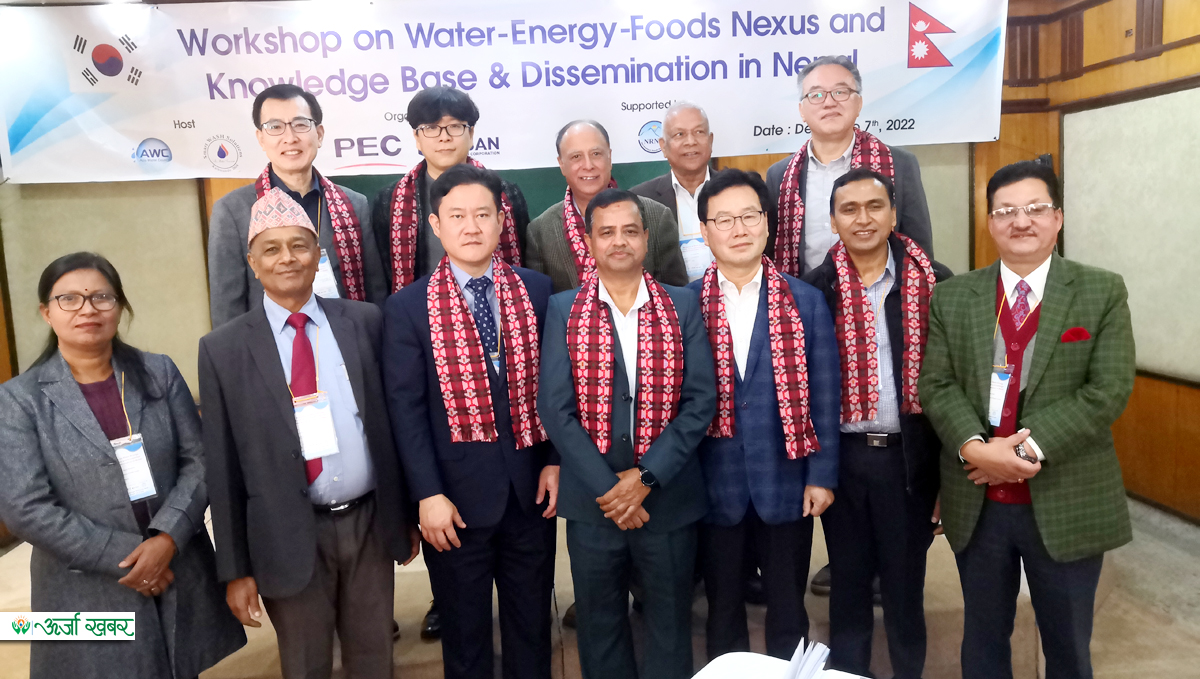
Kathmandu; It is not possible for any country to gain balanced development until they adopt policies to integrate clean and green energy and food security for an increasing world population at a time when the threat of climate change has emerged globally.
Stakeholders opined this view in a two-day interaction organized that kicked off in Kathmandu on Tuesday. The interaction was jointly organized by Asia Water Council, Korea and Smart Wash Solution, Kathmandu.

The participants urged to formulate plans integrating the issues of water, energy and food security globally. “The issue of food security assurance is vigorously emerging along with an increasing call for the sustainable water supply and energy security,” they said.
Speaking at the program, Mani Ram Gelal, secretary of the Ministry of Water Supply, said water, energy and food are among the essentials in the present world. “These are so closely connected that we cannot dissociate them in any circumstances,” he said. “That’s why we need to keep them closer while formulating plans and programs.”

Gelal added the factor plays an important role in maintaining healthy geopolitical relationships. According to him, the Government of Nepal has also been working on the line.
Ganesh Shah, former Minister for Environment, Science and Technology, stressed on the need for individuals to make proper utilization of water along with preventing wastages. The world population is projected to hit nine billion by 2050, while over one billion people are estimated to face extreme food crises by that time. “To prevent the crisis, we need to work from now on,” said Shah, adding that it will be possible only if the connection between energy and water is properly maintained.
Former Energy Secretary Suman Prasad Sharma underlined an increasing challenge on how to properly manage the supply of clean drinking water, irrigation for agriculture, development of green energy and food security on a daily basis. “As the children in rural areas have been going through a shortage of nutritious food, they are equally facing the inadequacy of clean drinking water supply,” Sharma said.
According to Sharma, the food production rate has not increased adequately in the country. “It is costlier to use ‘lift irrigation system’ to supply irrigation water to arable land in hilly areas.”
Sharma also opined that there should be the government’s concern to provide cheap and reliable electricity supply to ensure smooth irrigation facility for agriculture. He stressed on the need to increase per capita energy consumption from the existing 300 kW per hour, which could help maintain environmental balance by developing green energy. “Similarly, a closer coordination among the authorities is necessary to achieve linkages between water, energy and food,” he said.
Ramdeep Shah, chairman of Smart Wash, said there is no other option than to set a linkage among these three components globally in order to save human life and rapid economic development. “It could be a good economic model to achieve sustainable development and prosperity.”
Dr Shin, senior officer of the Asian Water Council, said Nepal and South Korea could collaborate to accomplish important tasks on the food crisis, clean energy supply and water management. “The interaction could provide a platform to work in cooperation in the future,” he said.